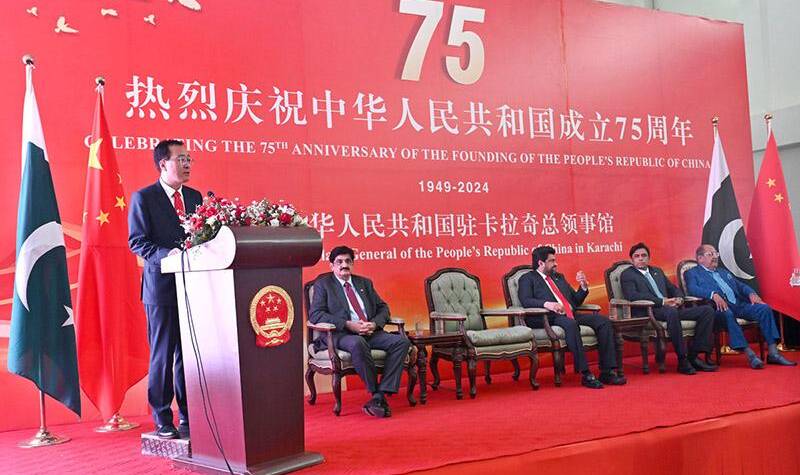By Muhammad Asif Noor
For seventy-five years, the story of the People’s Republic of China has been one of resilience, transformation, and a relentless pursuit of progress not only for the country itself but also for the world with the vision of a shared future for mankind. The transformation that China has undergone is nothing short of a monumental achievement—a journey from a struggling, agrarian society to a thriving, global power. As we reflect on China’s progress over these decades, what stands out is its ability to adapt, persevere, and craft a distinct path to development, rooted in its own Chinese values, goals, and unique challenges. Visionary leadership of China has helped the country to navigate a course that has not only changed its domestic landscape but has also had significant impacts across the world.
The story of China’s progress is a multifaceted one, with layers that encompass economic advancement, technological innovation, social transformation, and an expanding role on the global stage. The early years of the country, following the turbulence of the civil war, were dedicated to unifying a fractured country, rebuilding society, and laying down the foundations for industrial growth. In this period, national unity and collective effort became the driving forces behind China’s initial development. The commitment to creating a stable, unified country was crucial, and it enabled China to address poverty, hunger, and underdevelopment with a sense of collective resolve.
China’s transformation took a significant turn during the late 1970s with the reforms initiated by Deng Xiaoping. It was a period of opening up, both economically and ideologically. This marked the beginning of a gradual shift from strict central planning to a more market-driven economy. These reforms were not abrupt; they were deliberate and steady, ensuring stability while introducing market incentives. The idea of „crossing the river by feeling the stones“ was a cautious yet ambitious approach to economic experimentation. During this period, special economic zones were established, welcoming foreign investment and international business partnerships. The rapid growth of China’s GDP, the rise in living standards, and the expansion of industry and infrastructure all trace their roots back to the strategic opening-up policies of the 1980s.
The current leadership has added yet another dimension to this remarkable story. President Xi has emphasized a comprehensive vision for national rejuvenation—what is often called the „Chinese Dream.“ The country is steered towards a goal of becoming a fully developed and powerful nation by the middle of the 21st century. This vision is deeply intertwined with technological innovation, environmental sustainability, and national pride. It is about building a strong, modern China that can independently secure its future, a future not just defined by economic output, but also by technological prowess, social development, and cultural richness.
One of the key pillars of China’s recent achievements is its progress in technology and innovation. From building its own satellite navigation system to sending astronauts to its space station, China has made enormous strides in asserting its role as a leader in the global technology landscape. Economic and technological advancement alone is not the full story of China’s rise. Social stability and cultural continuity have played equally critical roles. Over the past seventy-five years, China has managed to create a stable society amidst rapid change. This has been achieved through deliberate policies that promote social welfare, education, and poverty alleviation. The eradication of extreme poverty is a milestone that exemplifies China’s success in improving the quality of life for its citizens.
On the international front, China’s approach to diplomacy and its role in global governance have evolved significantly. Initiatives like the Belt and Road Initiative (BRI) reflect China’s desire to extend its developmental model beyond its borders, fostering infrastructure development and economic partnerships across Asia, Africa, and beyond. Through all of these facets, the guiding principle of China’s leadership has been stability. The desire to maintain a stable environment for growth has influenced domestic policies, foreign relations, and economic strategies. This stability is seen not as an end in itself, but as a necessary condition for continued progress.
For Pakistan, China’s seventy-five-year journey holds valuable lessons. The emphasis on long-term planning, resilience, and adaptability is something that Pakistan can draw inspiration from. China’s progress in infrastructure, technology, and poverty alleviation showcases the importance of setting ambitious goals and working tirelessly to achieve them. The China-Pakistan Economic Corridor (CPEC), a flagship BRI project, is a testament to the potential that lies in collaboration and strategic partnership.
As China celebrates this milestone, it stands as a symbol of how vision, resilience, and commitment can transform a nation. It is not just the numbers—though they are impressive—that define China’s achievements. It is the story of millions lifted from poverty, of cities transformed into modern metropolises, and of a nation asserting its place in the world through careful planning and relentless pursuit of its goals.
*The writer is Founder of Friends of BRI Forum, Senior Advisor to Pakistan Research Centre at Hebei Normal University in China, Co-Founder of the Alliance of China-Pakistan Research Centres, and Senior Fellow at the Centre for CPEC Studies at Kashi University in China.

